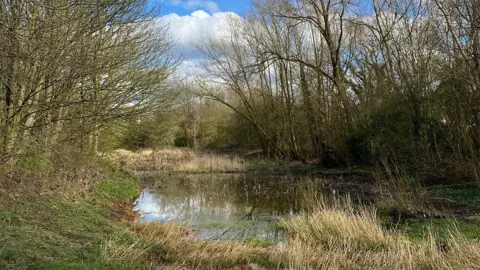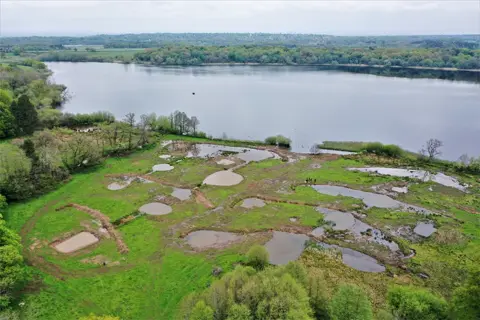Six major nature recovery schemes across England unveiled
 D Barlow MCC
D Barlow MCCSix new landmark nature projects to boost wildlife recovery and improve climate security are being launched by Natural England and the government.
The schemes cover 176,000 hectares (434,900 acres) of land including the Tees Estuary, South Downs and the Lost Wetlands in Cheshire and Lancashire.
They are designed to manage flooding, improve carbon stores and build diverse habitats for wildlife like the endangered wart biter cricket.
It also aims to boost access to nature.
The nature recovery schemes have received £7.4m of funding from the Department for Environment, Food and Rural Affairs (Defra).
 Natural England
Natural EnglandSouthern Greater Manchester and north Cheshire were once dominated by wetlands and rivers now lost to industrialisation, agricultural intensification, and urbanisation, leading to modified rivers systems and drained wetlands, Natural England said.
The recovery project will provide habitat refugia for wildlife during pressures such as climate change.
New wildlife corridors using nature-based solutions to connect wetlands to their rivers, recover ghost ponds and create riverine woodlands will facilitate species dispersal.
Natural England said this would improve water quality, climate resilience and carbon sequestration.
Ginny Hinton, Natural England area manager for Cheshire to Lancashire, said the lost wetlands nature recovery project was a "fantastic opportunity" to reclaim and restore a mosaic of wetland habitats across southern Greater Manchester and north Cheshire.
She said: "Once common wildlife such as water voles, great crested newts and lapwings will be able to thrive, and local communities will benefit from closer connections with nature."
Paul Farrand, senior planner at Trafford Council, said it shared the vision for "reclaiming and restoring" lowland wetlands, using nature-based solutions in line with the natural environment theme of its carbon neutral action plan.
"One site of interest is the former William Wroe golf course within the lost wetland project area," he said.
"It presents a major opportunity to work with prevailing site conditions and constraints to build upon the site's important role in providing access to nature for local residents in an urban setting, whilst recognising its potential to support nature and species recovery along with climate change adaptation through wetland creation."
The announcement builds on the G7 legacy project in Cornwall and the five nature recovery projects launched last year in the West Midlands, the Peak District, Somerset, Norfolk and Cambridge.

Why not follow BBC North West on Facebook, Twitter and Instagram? You can also send story ideas to [email protected]
